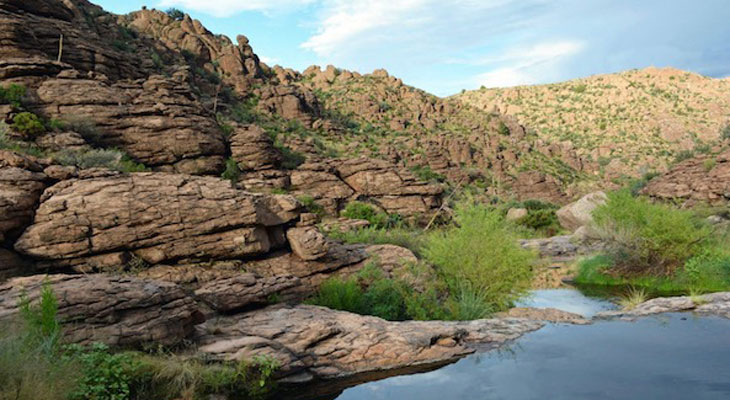Contributed Photo/Courtesy Sacred Land Film Project: Oak Flat, Chich’il Bildagoteel, is at the center of a dispute between the San Carlos Apache Tribe and Resolution Copper.
Contributed Article/Courtesy San Carlos Apache Tribe
SAN CARLOS APACHE RESERVATION— The San Carlos Apache Tribe has petitioned the United Nations Committee on the Elimination of Racial Discrimination (UNCERD) to call upon the United States government to withhold the transfer of sacred Oak Flat for the proposed Resolution Copper Mine in Arizona.
The Tribe’s 15-page petition details the “imminent” threat to “Apache religion, culture, and spiritual well-being” from the proposed mine that would destroy Oak Flat, which is listed on the National Register of Historic Places as a Traditional Cultural Property. Oak Flat is known in Apache as Chí’chil Biłdagoteel, which means “a broad flat of Emory oak trees.”
Oak Flat is located on the Tonto National Forest 70 miles east of downtown Phoenix. Resolution Copper Company plans to use a mining technique that would cause Oak Flat to collapse into a 1,000-foot deep, two-mile-long crater.
“The United States is violating and threatening to further violate the human rights of the Western Apache tribes guaranteed to them in international human rights instruments,” the Tribe states in its April 3, 2024, petition to the UNCERD filed under that body’s “urgent action and early warning procedure.”
“While majority religions have repeatedly been protected by United States courts, including the United States Supreme Court, Indian tribes have not once prevailed in their efforts in U.S. courts to achieve protection of their sacred places from desecration,” the petition states. “Such denial of protection of indigenous peoples’ religion to the same extent as non-indigenous peoples’ religion amounts to racial discrimination.”
Composed of independent experts from around the world, UNCERD is the United Nation’s official body dedicated to monitoring and promoting compliance with the International Convention on the Elimination of All Forms of Racial Discrimination, a treaty to which the United States is a party. Under the Convention, the United States is obligated to cooperate with UNCERD, which is authorized to intervene with governments on urgent matters of human rights involving racial discrimination.
“We call on the United Nations’ Committee on the Elimination of Racial Discrimination to take action to convince the United States to cease its relentless campaign on behalf of the world’s largest foreign-based mining companies that intend to destroy sacred lands to mine copper that will be exported overseas,” said Carlos Apache Tribe Chairman Terry Rambler.
The petition asks the U.N. committee to request the United States to “halt (its) racially discriminatory acts and omission” that will result in “irreparable harm” if Oak Flat is transferred to Resolution Copper and destroyed by mining. The Tribe specifically requested the committee to urge the United States to take five actions:
* Withhold permission to Resolution Copper to proceed with the planned mining activity that would destroy Oak Flat;
* Refrain from transferring Oak Flat to Resolution Copper;
* Ensure that no federal or private action threatens the cultural and religious sites essential to the Western Apache religion;
* Open discussions with the leaders of the Western Apache people to find solutions acceptable to them and that would comply with the United States’ obligations under the International Convention on the Elimination of All Forms of Racial Discrimination; and
* Work with the Tribe to develop and implement consent-based consultation procedures to ensure that any federal action taken that impacts the traditional lands or religion of the Western Apache be done with their involvement at the earliest possible opportunity.
Oak Flat was granted protection from mining under an Executive Order issued by President Eisenhower in 1955. But a 2014 non-germane rider to a defense spending bill requires the Forest Service to give Oak Flat to Resolution Copper within 60 days of publication of the Final Environmental Impact Statement.
The Trump administration published the FEIS in its final days on Jan. 15, 2021. The Biden administration subsequently withdrew the FEIS on March 1, 2021. The administration said the FEIS was withdrawn to provide the Forest Service additional time to ensure regulatory compliance of environmental, cultural, and archaeological analyses, and to fully understand concerns raised by tribes and the public.
However, as the Tribe’s petition to UNCERD explains, “The United States has not sought or obtained the San Carlos’s nor any of the other affected Apache tribes’ consent to the land transfer and mining of the area. In fact, nineteen of the 22 American Indian tribes in Arizona are on the record opposing the mine, with the backing of the Inter-Tribal Council of Arizona and the National Congress of American Indians.”
Resolution Copper has never stated where it intends to process the raw copper that would be produced by the Resolution Mine. The United States already exports 32% of the copper produced by its mines because of a lack of domestic copper smelting capacity, according to the United States Geological Survey. Resolution Copper is a joint venture of Anglo-Australian mining giants Rio Tinto (55%) and BHP (45%). Both Rio Tinto and BHP sell most of their mining products to China. Rio Tinto’s single largest shareholder with a 14.6% stake is the Aluminum Corporation of China, a Chinese state-owned mining company.
“All the evidence points to Resolution’s copper being exported to China, providing no benefits to the United States renewable energy economy,” Chairman Rambler said. “It’s unconscionable that the U.S. government is willing to inflict human rights violations through its discriminatory actions against the Western Apache people to benefit two foreign mining companies that are inexorably tied to China.”









